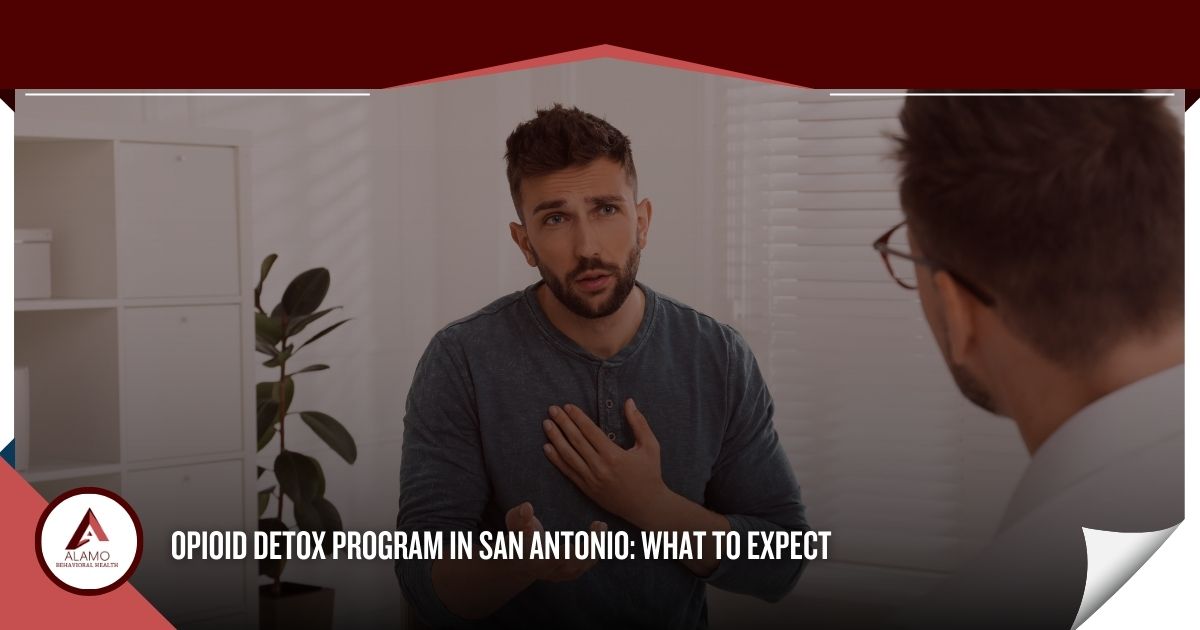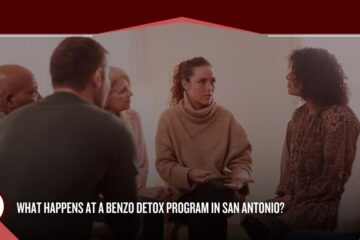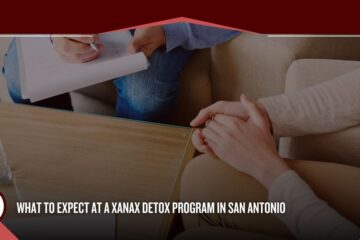Opioids are addictive drugs. There are illicit opioids, like heroin, and prescription opioid pain relievers. People who use opioids may develop physical dependence and addiction.
Opioid addiction is a complex condition. People with opioid abuse and addiction can struggle to stop using these drugs on their own. People with a substance abuse disorder need compassionate care and treatment.
Opioid addiction treatment typically begins with a medical detox program. Treatment facilities can provide the medical care, supervision, and support people need to have a safe detox and prevent relapse.
This article will explore what to expect from an opioid detox center in San Antonio. You will also learn about opioid abuse and addiction.
To find the best opioid detox San Antonio, contact Alamo Behavioral Health to learn about our programs. You may also schedule an intake assessment.
What Are Opioids?
Opioids are a type of drug. They include illicit drugs like heroin and prescription painkillers like hydrocodone.
Doctors sometimes prescribe opioid painkillers to patients who have had surgery. They may also prescribe opioids to people with chronic pain.
Common prescription opioids include:
- Morphine
- Tapentadol
- Meperidine
- Oxycodone
- Hydrocodone
- Dilaudid
- Oxymorphone
- Codeine
- Fentanyl
- Tramadol
Opioids work by binding to opioid receptors in the brain. Opioids affect parts of the brain responsible for emotions, pleasure, and pain control.
Opioid Abuse and Addiction
In addition to relieving pain, opioids can have other side effects, including:
- Euphoria (intense pleasure and well-being)
- Relaxation
- Drowsiness
- Slow breathing
People may like the way opioids make them feel and want to take more than prescribed. They might:
- Take more of a drug than prescribed
- Take a drug more often than prescribed
- Take a drug for longer than prescribed
- Use a medication differently than prescribed, such as crushing and snorting pills
People may also take opioids recreationally (without a prescription). Misusing opioids can lead to tolerance, meaning that people need to take more of the medication to get the desired effects.
Over time, misusing opioids can turn into a substance use disorder or addiction. People who develop opioid addiction often require significant support and substance abuse treatment to stop using these powerful drugs.
Understanding Opioid Withdrawal
Addiction occurs when a person’s body becomes physically dependent on a substance. People with opioid addiction cannot choose to stop taking these drugs. Their body depends on opioids to function.
When someone with physical dependence on opioids suddenly stops taking them, they may experience severe withdrawal symptoms. Symptoms of opioid withdrawal include:
- Excessive sweating
- Nausea
- Vomiting
- Chills
- Insomnia
- Elevated body temperature
- Higher blood pressure
- Fast heart rate
- Bone pain
- Muscle aches
- Anxiety
- Intense cravings for opioids
The intensity of symptoms and how long they last depend on the type of opioids a person uses and other factors.
Opioid withdrawal can be intensely uncomfortable and may last for a long time. People who try to detox alone are unlikely to be successful.
People with opioid addiction need medical supervision and tailored treatment plans to have a safe, complete opioid detox.
What to Expect in an Opioid Detox Program in San Antonio
Recovery from opioid addiction starts in an opioid detox program. Research shows that participating in medication-assisted treatment (MAT) gives people the best chance at a safe, complete detox and long-lasting recovery.
When you participate in an opioid detox program in San Antonio, you will receive care, treatment, and support in a safe environment.
Here is what you can expect in an opioid detox program.
Assessment
Before you start a detox program, your treatment team will assess your needs. This assessment may include:
- Information about your current substance use
- Medical and mental health history
- Family history of substance abuse and treatment
- A physical examination
- Lab testing
This information lets your treatment team identify any issues that may complicate detox.
Detox
Your treatment during detox will include:
- Medications to reduce cravings and other uncomfortable withdrawal symptoms. You may participate in a MAT program that uses methadone, Suboxone, buprenorphine, or clonidine to help you safely detox from opioids.
- Emotional support, including individual and group therapy, when appropriate
- Round-the-clock supervision, support, and access to mental health and medical specialists
- Holistic therapies to reduce stress and increase comfort, such as exercise, nutrition support, and mindfulness
Stabilization and treatment
The care you receive from a detox rehab center in San Antonio can help you prevent a life-threatening relapse. It will make sure you have a safe, complete detoxification. Then, you must continue to participate in a comprehensive treatment program.
Comprehensive treatment programs include:
- Individual, family, and group therapy
- Relapse prevention education
- Aftercare planning
- Medical and mental health treatment
- Holistic therapies
Early treatment can give people the tools and support they need to overcome addiction. It can help people avoid the life-threatening consequences of opioid addiction.
Find an Opioid Detox Center in San Antonio Today
If you or someone you love needs help to overcome opioid abuse or addiction, you are not alone. Contact the team at Alamo Behavioral Health now to learn about our substance abuse treatment programs.




